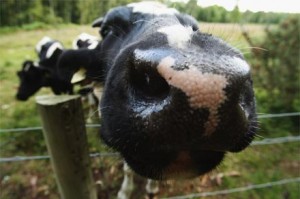 Like many, when I look for information I go online first. With so much information out there, I often wonder if it is accurate. According to a new study conducted by v-Fluence Interactive, the information consumers search for regarding the production practices that put meat and dairy products on their kitchen tables, they are most likely to see the kind of one-sided content featured in the documentary Food Inc. This is at the expense of content reflecting the points of view of most conventional producers or major food brands.
Like many, when I look for information I go online first. With so much information out there, I often wonder if it is accurate. According to a new study conducted by v-Fluence Interactive, the information consumers search for regarding the production practices that put meat and dairy products on their kitchen tables, they are most likely to see the kind of one-sided content featured in the documentary Food Inc. This is at the expense of content reflecting the points of view of most conventional producers or major food brands.
“Our research shows very few conventional producer groups or well-known food brands have a presence in the content that most frequently shows up when consumers search on these food production topics,” says Randy Krotz, senior vice president and head of v-Fluence’s Food and Agriculture practice. “And when they do, it’s more likely because organic competitors or animal rights advocates are talking about them in a critical manner.”
Krotz notes that in addition to omitting important voices that consumers should hear, this environment creates an uphill battle for producers and brands that seek to promote more animal-friendly production techniques. It is becoming more commonplace for producers to discuss their sustainability and corporate reputation initiatives as more attention is focused on environmental issues – often relating to agriculture.
Here are some key findings from the study:
- 70 percent of the content consumers are likely to see when they search for information about beef production comes from producers of organic or grass-fed beef, rather than from conventional producers. A good example is the documentary Food Inc., which unfairly criticized food and meat production and is received major buzz and this year’s Toronto Film Festival.
- 60 percent of the content consumers see when they search for poultry and egg production topics comes from promoters of free-range and organic chicken. About 30 percent of the visible and influential content found online comes from advocacy groups such as United Poultry Concerns.
- Content critical of large-scale producers of beef and poultry appears when consumers specifically search for animal welfare topics. The content includes references to the treatment of animals and workers at slaughtering and packing facilities and comes from advocacy groups like the People for the Ethical Treatment of Animals (PETA).
- Consumers associate some large food producers and brands with animal welfare and well-being more than others when they search. The study’s analysis of consumers’ most frequently-used search terms shows they link meat supplier Cargill and Tyson – via search terms like “Cargill animal welfare” and “Tyson free range chickens” – to these topics more than other brands.
- Consumers also appear more likely to search for advocacy groups, such as the Animal Welfare League, Animal Welfare Society and Animal Welfare Institute, more frequently than food production companies, producer groups and individual brands when they are interested in animal welfare and well-being topics.
The solution to the problem? Organizations should ramp-up their online content so that consumers have a greater opportunity to see more balanced content. To learn more about v-Fluence’s findings and to learn how to more effectively blow-up your content online, visit www.v-fluence.com.

